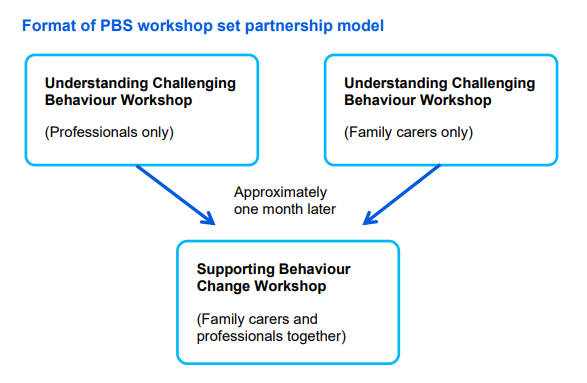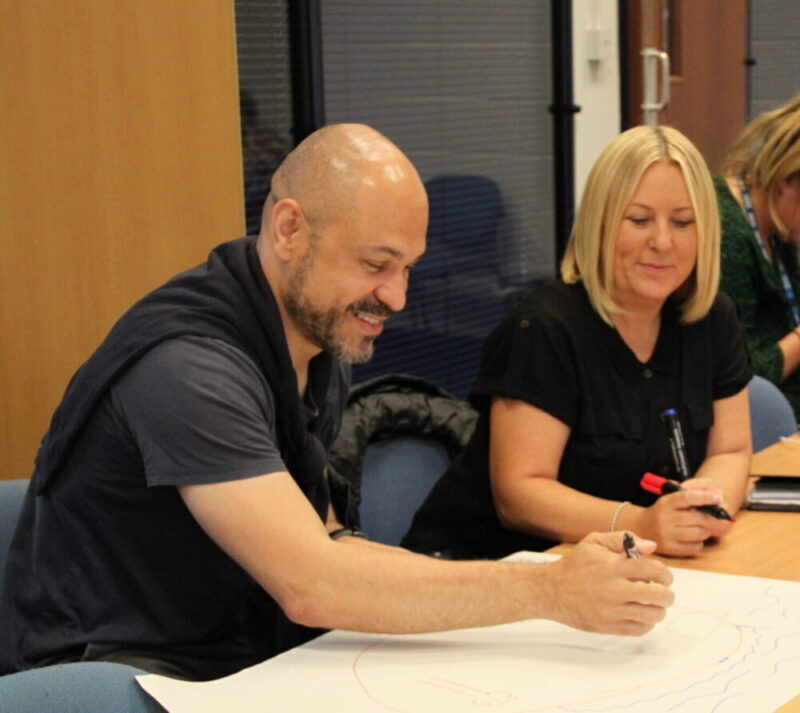Our workshops
Trauma Awareness Training for Professionals
Communication and Challenging Behaviour
What is PBS?
PBS is an evidence-based approach to supporting people whose behaviour is described as challenging. It is a multi-element approach to understanding an individual’s behaviour and developing personalised support arrangements that, while intended to reduce challenging behaviour, have a primary focus on improving quality of life for them and their support network.
Positive Behaviour Support
Part 1: Understanding Challenging Behaviour (UCB) – content
Note: UCB and SBC form a two-part workshop set about PBS.
UCB includes:
- What is challenging behaviour
- The impact of challenging behaviour
- Reasons for behaviour
- Context and environment
- Purposes (functions) of behaviour
- Reinforcement
- Setting events and triggers
- Sensory differences
- ABC recording
- A story of success
- How to look after yourself
To discuss further, contact us (see the bottom of this page).
Part 2: Supporting Behaviour Change (SBC) – content
Note: UCB and SBC form a two-part workshop set about PBS.
SBC includes:
- Why do people challenge (recap)
- Reasons and purpose (recap)
- Arousal curve
- Positive Behaviour Support
- Proactive and reactive strategies
- How to prevent challenging behaviour
- How to stop behaviour escalating
- How to respond to an incident
- What to do after an incident
- Individual planning and behaviour support plans
- Working in partnership
To discuss further, contact us (see the bottom of this page).
Excellent training. Although the experience was intensive (and I felt emotionally tired afterwards) it is rare that I have attended training sessions that have managed to fully hold my attention for the entire duration. I learnt a lot.
Partnership model
UCB and SBC form a two-part workshop set about PBS. The workshops are suitable for both professionals and family carers. The length of the workshop is 4.5 hours, with SBC being held approximately one month after UCB.
The workshops facilitate partnership working, to enable staff and families to work together to identify appropriate individualised behaviour support strategies that can be used consistently in all settings.
This diagram of the workshops format shows how our working in partnership model works:

What I like best about the workshop is working alongside parents, having the time to reflect on challenging behaviour, to step back from a situation and reflect on it, and then plan together. Speech and Language Therapist
What’s had the greatest impact is working as a team. We all know that we are all doing the same thing and consistency has had a huge impact. Family carer
Positive Behaviour Support (PBS) one day intensive workshop – UCB and SCB combined
This course is 7 hours long and is suitable for professionals and paid staff only. The content is a combination of the UCB and SCB courses above and is delivered if organisations are unable to release staff for more than one day.
The workshop will include:
- What is challenging behaviour
- Context and environment
- Setting events and triggers
- Purposes (functions) of behaviour
- A story of success
- Positive Behaviour Support
- Proactive and reactive strategies
- How to prevent challenging behaviour
- How to respond to an incident
- Individual planning and behaviour support plans
- Working in partnership
Trauma Awareness Training for Professionals
The workshop facilitates professionals’ understanding on the experiences of families navigating health, social care and education systems and the layers of trauma they experience throughout this. It explores the factors that contribute to traumatic experiences and encourages professionals to reflect on how their service can prevent or mitigate any further trauma to families.
Informed by Lived Experiences
The film resources in the workshop, where families talk directly about their traumatic experiences, were developed through co-production with family carers. From “this is what it feels like” to why it happens, the film connects individual experiences to systemic gaps. The facilitated discussions are strategically placed to reflect on individual actions that could prevent trauma from occurring. Main Aims
- Raise awareness of why the system is traumatising families
- Identify the need for relational, humanised, and proactive support
- Highlight the ways trauma can affect people
- Identify how we all can be accountable for our actions, judgements, and assumptions
“I wasn’t sure what to expect, I’m glad to say that the training was really informed by shared experiences that valued our humanity. My experience has been wonderful in terms of learning and thinking about what I will do next in my practice with families. We just need to listen to each other.” Social Worker, Participant
Pica Awareness Workshop
The CBF’s Pica Awareness workshop is specifically designed for professionals, support staff and family carers who are supporting children, young people or adults who have severe learning disabilities and display Pica behaviour (eating inedible objects) and/or polydipsia (drinking fluids).
The Pica Awareness workshop will be delivered to support staff who will benefit from understanding the risks to the individual, the importance of understanding the behaviour characteristics and the need for vigilance. It is suitable for those staff who will be directly or occasionally supporting someone who may display this behaviour characteristic. We shall discuss the particular behaviour of the person/persons you support prior to delivery of the workshop in order that we can tailor it to your specific requirements.
The Pica Awareness workshop is 4.5 hours long and can accommodate up to 20 attendees in a physical environment, or 12 attendees in a virtual setting.
The workshop will ensure that you have a good, practical, introduction and understanding of Pica behaviour and how to support people to keep them safe.
Find out more about Pica and Polydipsia Contact Us
Communication and Challenging Behaviour

This practical 4.5 hour workshop is an introduction to the links between communication and behaviour. Aimed at anyone who wants to understand how to improve communication with individuals with severe learning disabilities – in turn improving their quality of life, choice and behaviour.
This workshop includes:
- What is communication and why it is important
- What makes communication difficult
- The relationship between communication and challenging behaviour
- Alternative approaches to communication (inc. pictures, signing, intensive interaction, digital communication aids)
- Communication passports
Whole Family Approaches
Our whole family approaches workshop is developed for professionals who would value the opportunity to engage in a reflective and practical course to improve practice around family centred approaches.
Participants have the opportunity to explore how embedding family-centred approaches enhances a strengths-based approach to collaborative working with families.
This 4.5 hour workshop includes:
- Identify what working in partnership has been like from a family’s perspective
- Explore the lived experience of families navigating a system of support
- Identify what is a whole family approach and why a family centred approach is important
- Understand the concept of institutionalising parent carer blame: findings from research
- Consider your role in supporting families, decide what strategies will best suit them
Contact us

Further information about workshops
For more information about our workshops, you can access our training workshop brochure below.
Please contact us for further details about our workshops by completing the form below, or by emailing workshops@thecbf.org.uk or calling us on 01634 838739.
Send me more information about CBF workshops
Hosting CBF workshops
Organisations wishing to host CBF workshops should download, complete and email back the Expression of interest to: workshops@thecbf.org.uk

